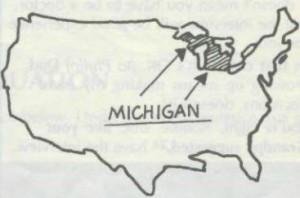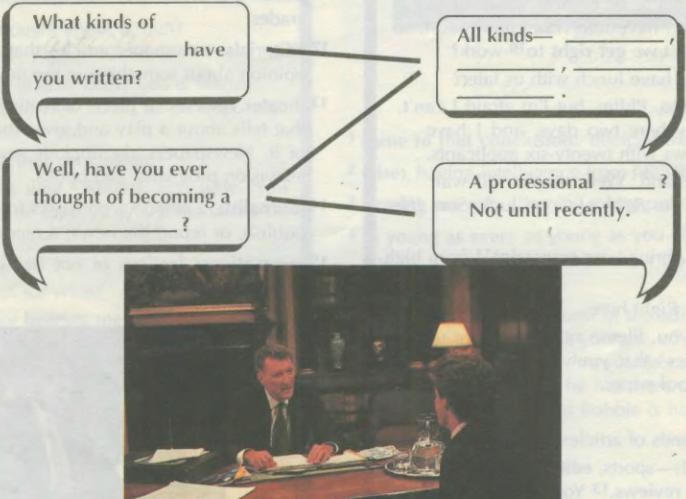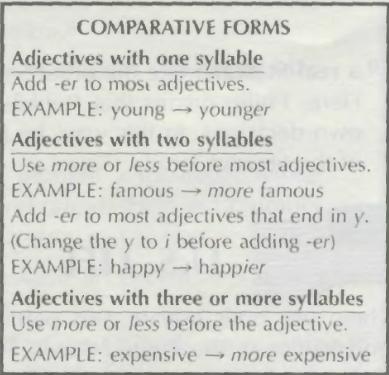Family Album USA 9 — It’s up to You
Смотреть онлайн курс английского языка Family Album USA 9 серия «It’s up to You» с английскими субтитрами и упражнениями:
Упражнения и словари к 9 уроку Family Album USA:
IN THIS EPISODE, YOU WILL STUDY . . .
VOCABULARY
applicant
transcript
journalist
tuition
GRAMMAR AND EXPRESSIONS
comparative and superlative adjectives
PRONUNCIATION
intonation of information questions
stress of prepositions in sentences
U.S. LIFE
- What is the difference between a college and a university?
- What are the entrance requirements for American colleges or universities?
- What are some liberal arts subjects?
YOUR TURN
- How do students apply to colleges or universities in your country?
- Do students in your country usually leave home when they go to college?
anyway: I would like to know. Use anyway with this meaning after an information question.
What are you working on? For information questions, the voice rises on the last stressed syllable, and then the voice falls.
Prepositions such as on are not usually stressed in sentences. An exception is a preposition that is part a two-word verb. For example, to work out a problem or to work a problem out means to try to find a solution. Since the preposition out is part of this two-word verb, out is stressed. Compare the intonation of the following question with the intonation of the example above.
paper: newspaper
turn (it) in: give (it) to the teacher
What’s it about? = What is the topic?
article: a piece of writing, usually for a newspaper, a magazine
scared: afraid; frightened
scary: frightening. This is the adjective form of the verb to scare.
I don’t mind. = It doesn’t bother me.
the worst. This is the superlative form of the adjective had. Use the superlative form to compare three or more things. The comparative form of had is worse. Use the comparative form to compare two things.
bad — worse — (the) worst

cheering: shouting approval. You often cheer when you want a team to win a game.
Dean of Admissions: the person in charge of deciding which students may enter a school or university
it turns out: the interesting fact is
classmate: another student in your class
interview: to meet in order to ask questions
applicants: people who apply. A college applicant is a person who wants to study at a particular college.
fit (you) into his schedule: to find time to meet with (you)
the best. This is the superlative form of the adjective good. The comparative form is better,
good — better — (the) best
schools. Here, schools means «universities.»
Engineering School. A university often has many colleges, or schools, such as a law school, a medical school, and an engineering school.
university club. Many universities have meeting places in different cities. The members of each of these clubs have graduated from the same school.
In that case . . . = If that’s true . . .
like your Grandpa suggested. This is informal. The standard form is “as your Grandpa suggested”.
head: to go in a certain direction
U . S . LIFE
In their last year of high school, students often apply to more than one college or university. A university is larger than a college. In fact, most universities have an undergraduate school and graduate schools in different fields such as law, engineering, and art. Each college or university in the U.S. has its own requirements for admission. Most schools require students to take a standard entrance exam. To decide whether or not to accept a student, colleges or universities usually consider the test scores as well as the student’s high-school grades. In addition, some schools require a personal interview. Many students choose to go away from home and to live at college. Other students attend a state or local school and continue to live at home.
YOUR TURN
- Do high-school students in your country usually apply to more than one college or university?
- Are high-school grades important for college admission? Is there a standard college entrance exam in your country?
- Do most students in your country leave home when they go to college?
Activities
AFTER GRADUATION
Why does Robbie feel scared and excited? Read each sentence below. Underline every sentence that gives a reason for Robbie’s feeling scared and excited.
- He’s thinking about his future.
- He doesn’t want to go to college.
- He may be leaving home.
- His father says he must go to the University of Michigan.
- He must make some decisions.
- He cannot finish his article for the high-school newspaper.
- He knows he’s going to become a doctor.
THE UNIVERSITY OF MICHIGAN
Read each of the following statements. Choose true or false according to the information in Act I. If the sentence is false, change the underlined part, and rewrite the corrected sentence on the blank line.
1. The University of Michigan has a football team. (TRUE or FALSE)
______________________________
2. Philip studied medicine there. (TRUE or FALSE)
_______________________________
3. GRANDPA studied medicine there. (TRUE or FALSE)
________________________________
4. Philip knows the President of the university. (TRUE or FALSE)
_________________________________
5. Philip and Charley Rafer played football there. (TRUE or FALSE)
_________________________________
wise: having intelligence from life’s experiences
hearing me out: listening to my point of view
as young as ever: as young as you always looked. Use as + adjective + as to show equality.
Youngest. This is the superlative form of the adjective young. The comparative form is younger. Philip should really say my younger son because he has only two sons. But he has three children, and he is probably thinking that Robbie is his youngest child.
good at: talented
frankly: honestly; truthfully
Doesn’t show. = It doesn’t show. Dean Rafer means that Philip doesn’t look as if he’s been working too hard. In other words, he thinks that Philip looks good.
the toughest: the most difficult. This is the superlative form of the adjective tough.
get right to: to start (something) immediately
transcript: an official document listing a student’s grades
editorials: newspaper articles that give the editor’s opinion about something in the news
theater reviews: a piece of writing in a newspaper that tells about a play and gives the writer’s opinion of it. Newspapers also include reviews of films television programs, and books.
journalist: a person who works to gather, write edit, publish, or report the news; a reporter
reservations: feelings of not being sure about something
U.S. LIFE
The most common college degree is a bachelor of arts, or a B.A., degree. This degree usually requires four years of study. During the first two years, a student often takes liberal arts courses to receive a general education. Liberal arts courses include the study of literature, languages, and history. Then, in the last two years of college, a student focuses on a major subject, his or her specialization.
YOUR TURN
- Which college degrees are the most common in your country?
- In which year of college does a student usually begin to focus on a major subject?
Activities
IT’S UP TO YOU
Complete the following sentences from Robbie’s interview. If you wish, you may look back at the script for Act II.
WORD SEARCH
Read the clues. Then find the words and circle them. The answers are written across or down. The first two answer are given.
CLUES
- Robbie came to the conclusion that the interview could be an important experience for him.
- Robbie thanked his father for hearing him out.
- Philip said that Charley Rafer looked ______ young as ever.
- Robbie told the dean that he wasn’t very _____ at tennis.
- Dean Rafer had a lot of interviews so he wanted to _____ right to work.
- The dean asked Robbie for his high-school _____.
- The dean saw that Robbie had some _____ about becoming a journalist.
Columbia University: a private university in New York City
NYU: New York University. This is another private university in New York City.
indecision: not being able to decide, or choose
follow in your father’s footsteps: to become like your father. Here, Mike means that Robbie can be a doctor, like his father.
given up: sacrificed. Robbie means that his parents have not spent money for themselves in order to save money to pay for his college education.
tuition: the cost of education at a college or private school
accepted: permitted to enter
impressed: having a positive opinion or feeling about someone or something
clear: sure
a real Stewart: like the other Stewarts. Were, Philip means that Robbie wants to make his own decisions. In this way, he is like other members of the Stewart family.
U.S. LIFE
There are both private and public colleges and universities in the United States. Private schools, like Columbia University and NYU, are more expensive than public institutions, which receive money from state or city governments. More than 30% of young American adults attend college. There are about 3,000 institutions of higher education in the United States.
YOUR TURN
- Is college tuition very expensive in your country?
- About what percent of your country’s population attends college?
- About how many colleges or universities are there in your country?
COMPARISONS
Study these rules for the comparison of adjectives.











